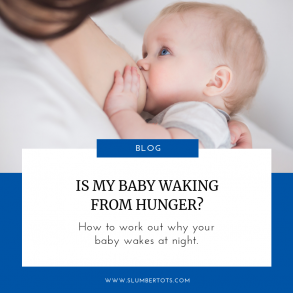
When it comes to babies waking in the night, many parents ask themselves, “is my baby waking from hunger?”
We’re all willing to do whatever it takes to ensure that our babies are properly nourished, that’s a given. But as anyone who’s baby wakes in the night will tell you, it can be tough to always know why they’re crying.
Is my baby waking from hunger?
Your baby really only has one method of communicating. So if mummy’s not around and they’re not happy about it, they cry.
However, they don’t just cry because they want mummy.
They might cry because they’re uncomfortable, because they’ve got a dirty nappy, because they’re too hot or too cold. They may also cry because they’re hungry.
So when they wake up in the middle of the night and start crying, it’s tough to determine whether it’s because they need to eat or because they just want to see mummy back in the room.
I’m not trying to tell you that you shouldn’t respond to your baby’s crying. You know your baby better than anyone and often you can tell when something needs to be addressed based on the intensity, pitch, and duration.
But having said that, if your baby is waking up seven or eight times a night and need you to come in and rock or feed her back to sleep, that can have a serious impact on everybody’s sleep, including hers.
A lot of babies have developed a dependency on feeding, rocking, sucking, and so on, in order to get to sleep, and it’s not something they can overcome in 15 or 20 minutes.
Solving that issue can take a bit more time and effort.
But in the meantime, here are a few things to consider when you’re trying to determine why baby is waking.
Is baby under six months old?
Up until about six months old , babies often need at least one night feed.
Their tummies are small, they haven’t started solids yet, and milk, be it formula or breast milk, digest fairly quickly.
So there’s a good chance they’re going to be hungry and need a feed during the night.
This isn’t the case for all babies. Some will sleep through the night without a feed from a couple of months old, as they get their calories during the day.
This isn’t something my own children ever did, so to me it’s quite normal to feed in the night, and sleeping through at this age isn’t something I push for.
But there are ways to put a plan in place so when baby is ready she can drop the feed herself.
So generally speaking, you can expect to be giving for a nighttime feed up until baby’s hit about six months.
Is baby eating enough during the day?
Once baby’s capable of sleeping through the night without a feed, you need to make sure they’re getting the calories they need during their daytime hours.
The best way I’ve found to make this switch is to throw in an extra feed during the day. Or you can add an ounce or two to each bottle throughout the day.
This is also a great time to think about introducing solid foods, as baby turns 6 months.
The good news here is that baby’s body will typically adjust over a night or two. They will start taking in those additional calories during the daytime once they’re no longer getting them at night.
Just a quick but important reminder… Before you attempt to make any changes to your baby’s feeding schedule, do talk to your GP or health visitor.
Nighttime sleep is great but calories are essential. If your little one is underweight or you have concerns about them not following their centile line growth, it might not be a good time to wean out night feedings. So have a chat with your doctor to make sure.
Is baby falling asleep quickly when you feed them?
This scenario may sound familiar.
Baby starts crying 45 minutes after you put her down. You go in and offer a feed which she eagerly accepts, she takes a tiny feed and then promptly falls asleep.
If this happens frequently, it’s a good sign that your little one’s feeding for comfort or out of habit, rather than hunger.
Babies who are genuinely hungry will usually eat until they’re full. Whereas those who are feeding for comfort tend to drift off pretty quickly once they’ve got what they’re looking for.
Does baby sleep for a good stretch after feeding?
If baby takes a full feed at night, she should be able to sleep for a good few hours afterwards.
An average sleep cycle for babies around the 6 month mark is somewhere around the 45minute – 1 hour mark. If baby is waking about an hour after the feed, it’s likely they’re dependent on feeding to sleep.
Will baby go back to sleep without a feed?
Falling asleep while you’re hungry is tough, regardless of your age.
Your brain recognises hunger as a priority and will stay alert until that need is met.
So if your baby really is hungry, they won’t go back to sleep very easily until they’ve been fed.
If they nod off after five or ten minutes of crying or fussing, that’s a pretty reliable sign that they were just looking for some help getting back to sleep and not actually in need of a feed.
Does baby fall asleep independently?
This question is cornerstone of all of the work I do, and is integral to baby sleeping well.
Can your baby fall asleep on their own?
Can you put your baby down in her cot fully awake and leave the room,? So she falls asleep without any help from you, a dummy, or any other kind of outside assistance?
If the answer to this is yes, then those nighttime cries are far more likely to mean that she genuinely needs a hand with something when she wakes up crying at night.
Determining whether your baby’s hungry at night can be tricky.
Calories are vital but so is sleep, so we typically end up stuck trying to balance the two.
However, this balancing act is much easier to crack once your baby has the skills to fall asleep independently.
Once the habit of feeding to sleep is broken, you can feel confident that requests for a nighttime feed are out of necessity. And not just a way of getting a few extra minutes with mummy.
If you’d like some support in teaching your little one those essential sleep skills, I’m here to help.
